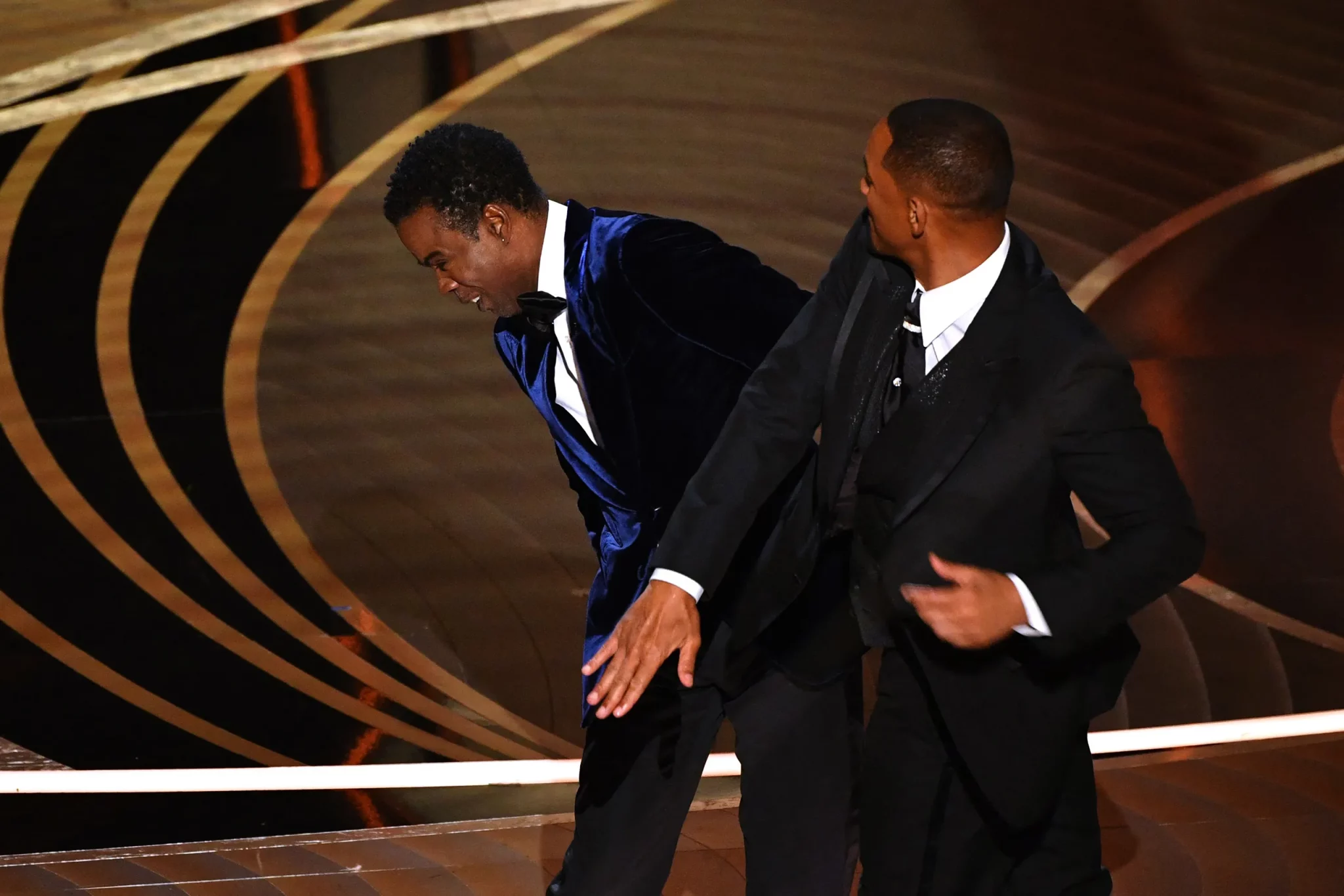Visit Twitter (or any social media platform for that matter) in the hours since Sunday Night’s Oscars, and you’re forced to make a choice. Was Will Smith right to slap Chris Rock for his joke or wasn’t he?
The slap came after Chris Rock, one of the most respected comedians of all time, made a not-so-funny joke about Will Smith’s wife, the actress Jada Pinkett Smith, who shaves her head. She shaves it because she’s losing her hair.
The scientific name for baldness is alopecia. The condition is less common for women, but 35 percent of men will lose most of their hair to it. And they have endured bald jokes for ages. For women, hair loss typically comes on with the onset of menopause, as appears to be the case for Pinkett Smith. There is no cure for alopecia.
Rock made the comment, which you’ve likely seen by now, suggesting a G.I. Jane movie sequel. Pinkett Smith rolled her eyes, which is the response most people would have to a joke like this. Smith initially laughed out loud.
But then, almost like he was hypnotized, Smith stood up, walked to the stage, slapped Rock hard in the face, then returned to his seat. Smith followed the assault with obscenities, yelling to Rock, twice, “Leave my wife’s name out your fucking mouth.”
Rock, stunned a moment, went on with the show.
But what if it hadn’t been Rock? What if it had been one of the hosts who made the joke? What if had been Regina Hall, Amy Schumer, or Wanda Sykes? They’re all women—would Smith have hit them? What if it had been a white man? What would have happened if Will Smith hit Ricky Gervais instead of Chris Rock?
What didn’t happen after the incident was in some ways even more shocking than the assault. Smith wasn’t asked to leave. No police report was filed. He received a standing ovation for his victory. He danced the night away at Oscars after-parties.
‘A Slap to Women’
So if you choose the first option—Will Smith was right to hit Rock—then you likely believe he was defending his family, his wife. “Protecting” is the definition he chose when less than an hour after the incident, he was back on the stage accepting his first, and quite likely, his last Oscar. Comedian Tiffany Haddish called the slap “the most beautiful thing I’ve ever seen”, praising Smith for drawing a line in the sand and protecting Black women.
“Actually, it was the opposite. Smith’s slap was also a slap to women,” basketball legend Kareem Abdul-Jabbar wrote of the event in a Substack post entitled “Will Smith Did a Bad, Bad Thing.”
“If Rock had physically attacked Pinkett Smith, Smith’s intervention would have been welcome. Or if he’d remained in his seat and yelled his post-slap threat, that would have been unnecessary, but understandable,” Abdul-Jabbar writes.
“But by hitting Rock, he announced that his wife was incapable of defending herself—against words. From everything I’d seen of Pinkett Smith over the years, she’s a very capable, tough, smart woman who can single-handedly take on a lame joke at the Academy Awards show.”
“This patronizing, paternal attitude infantilizes women and reduces them to helpless damsels needing a Big Strong Man to defend their honor least they swoon from the vapors. If he was really doing it for his wife, and not his own need to prove himself, he might have thought about the negative attention this brought on them, much harsher than the benign joke. That would have been truly defending and respecting her. This ‘women need men to defend them’ is the same justification currently being proclaimed by conservatives passing laws to restrict abortion and the LGBTQ+ community,” he wrote.
If you choose the second option—that violence is abhorrent and Smith should have been ejected from the event after physically assaulting Rock—then you’re likely still in shock at the events that have taken place since. There are plenty of reasons to feel that way.
“The Black community also takes a direct hit from Smith,” explains Abdul-Jabbar. “One of the main talking points from those supporting the systemic racism in America is characterizing Blacks as more prone to violence and less able to control their emotions. Smith just gave comfort to the enemy by providing them with the perfect optics they were dreaming of. Fox News host Jeanine Pirro wasted no time going full-metal jacket racist by declaring the Oscars are ‘not the hood.’ What would she have said if Brad Pitt slapped Ricky Gervais? This isn’t Rodeo Drive? Many will be reinvigorated to continue their campaign to marginalize African Americans and others through voter suppression campaign.”
Will Smith’s violent history
Just a few months ago, in the exact same theater where the Oscars happen, the Dolby Theater in Hollywood, Smith sat across from filmmaker Ava DuVernay. It was the Los Angeles launch event for his highly anticipated memoir, Will. It was Omicron times, but the theater was packed. Smith was pumped. He took the stage solo before DuVernay came out to interview him; he rapped like old times, hyping up the masked audience, helping them feel like everything was finally getting back to normal. The audience, for a lack of a better word, appeared to feel protected by his mere presence.
DuVernay served as interviewer, navigating Smith and the audience through his fascinating story, which begins on the streets of West Philadelphia in the 1970s. One of the most defining moments of his childhood—of his life—choked him up on stage. It is the profound guilt he says he experienced in watching his father beat his mother while a young Smith stood by too stunned to interfere.
He’s been paying for that guilt in one way or another for most of his life, he says—trying to prove himself to his family, to his community, to himself. Fast-forward 40 years to arguably the most important night in Smith’s life—he’s only the fifth Black man to win an Oscar for a performance in a leading role—and he appears to still need to right that wrong. I’m no psychologist, but I’d say he wasn’t hitting Rock on that stage Sunday night; he was, in his finest hour, finally brave enough to hit his father.
Smith self-sabotaged the most important night of his life because despite all the fortune, the fame, the ayahuasca healing ceremonies, he still hasn’t forgiven himself for failing to protect his family when it really mattered—not from a bad bald joke, but from life-threatening abuse.
And perhaps stepping onto that stage and slapping Chris Rock offered Smith some healing of his own, but what about everyone else?
The world is still shaking from the devastation of the pandemic. Many of us just watched Ketanji Brown Jackson endure unthinkably racist and sexist attacks at her Supreme Court Senate hearing. (So did her husband, Patrick G. Jackson, and he did not slap anyone.) The people of Ukraine are under attack. Climate change is coming at us hotter, wetter, and faster than expected. It all feels rather hopeless, doesn’t it?
If you approved of Smith’s slap, likely it was because the world kind of needs a take-no-shit superhero right now. It really does. But is it more woke to hit someone or let it roll off your back? Are there bigger battles to fight? Is it right to work up tears as you walk to the stage and accept an award when most any other Black man to hit someone in public like that would most likely be arrested on the spot, or worse?
Reports say Rock was unaware of Pinkett Smith’s condition. Should Smith have confirmed this first? Could he have caught up with the comedian backstage and updated him on it? Rock would likely have issued a public apology, and Smith’s biggest night would have been his biggest night for all the right reasons.
But there’s a footnote on his victory now—a footnote that may turn into a whole new chapter for Hollywood.
“Worse than the slap was Smith’s tearful, self-serving acceptance speech in which he rambled on about all the women in the movie King Richard that he’s protected,” Abdul-Jabbar says. “Those who protect don’t brag about it in front of 15 million people. They just do it and shut up. You don’t do it as a movie promotion claiming how you’re like the character you just won an award portraying. By using these women to virtue signal, he was in fact exploiting them to benefit himself. But, of course, the speech was about justifying his violence.”
And it’s this last bit “justifying his violence” that’s the real takeaway. This is the systemic problem that is at the crux of our broken planet. Russia’s attack on Ukraine is happening because Putin, like so many dictators before him, has talked himself into it and censored the media to fit that narrative in order to convince Russians he is merely protecting them, their homeland. They need Putin like Jada needed Will to do her bidding on Sunday.
This type of “justified” violence is at the heart of our climate crisis, too; it’s the spire of white man’s capitalism that has sent our planet into a tailspin as exploitation of people and resources scorch our forests, poison our waters, and threaten our future.

“What is the legacy of Smith’s violence?” Abdul-Jabbar asks. “He’s brought back the Toxic Bro ideal of embracing Kobra Kai teachings of ‘might makes right’ and ‘talk is for losers,’ says Abdul-Jabbar. “Let’s not forget that this macho John Wayne philosophy was expressed in two movies in which Wayne spanked grown women to teach them a lesson. Young boys—especially Black boys—watching their movie idol not just hit another man over a joke, but then justify it as him being a superhero-like protector, are now much more prone to follow in his childish footsteps. Perhaps the saddest confirmation of this is the tweet from Smith’s child Jaden: ‘And That’s How We Do It.’”
Smith posted an apology to Instagram on Monday:
Violence in all of its forms is poisonous and destructive. My behavior at last night’s Academy Awards was unacceptable and inexcusable. Jokes at my expense are a part of the job, but a joke about Jada’s medical condition was too much for me to bear and I reacted emotionally.
I would like to publicly apologize to you, Chris. I was out of line and I was wrong. I am embarrassed and my actions were not indicative of the man I want to be. There is no place for violence in a world of love and kindness.
I would also like to apologize to the Academy, the producers of the show, all the attendees and everyone watching around the world. I would like to apologize to the Williams Family and my King Richard Family. I deeply regret that my behavior has stained what has been an otherwise gorgeous journey for all of us.
I am a work in progress.
But apologies don’t change reality. They don’t alter history. They can help build a better future, sure, but like Janai Nelson, the president and director-counsel of the NAACP Legal Defense and Educational Fund, said on Twitter Sunday night, “I know we’re still processing, but the way casual violence was normalized tonight by a collective national audience will have consequences that we can’t even fathom in the moment.”


